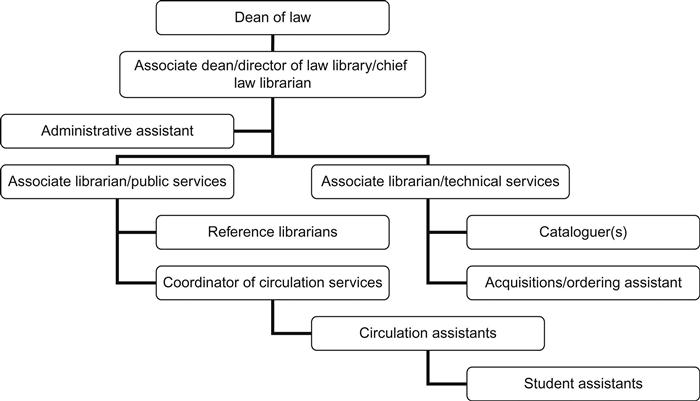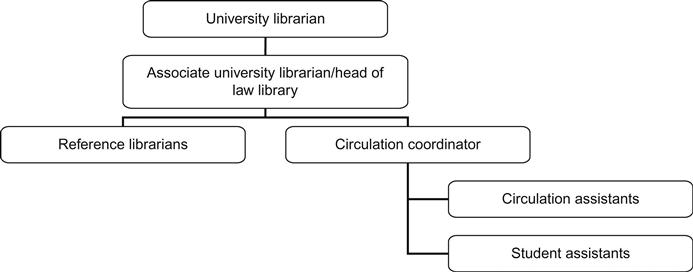Management & administration in academic law libraries
This chapter discusses the management and administration of the academic law library by reviewing the models that are currently in practice under an autonomous and centralized system. It highlights the current practices in the management of human, financial and physical resources.
Keywords
management; administration; human resources; financial resources; physical resources
While library schools teach theories of management, administration and leadership, implementing them requires a totally different approach. I should emphasize that not all the theories are practical in the workplace. Management and administration of a law library involves overseeing the operations of human, physical and financial resources. This is a very demanding task and there is no written rule for managing human resources because each situation is different. Depending on the administrative structure, the head of the law library reports to either the Dean of the Law School, the Dean of Libraries/University Librarian, or to both of them. See Chapter 1 on administrative structures. The head of the law library is responsible for managing the human, physical and financial resources of the department.
The typical organizational structure in an autonomous academic law library is shown in Figure 7.1 while Figure 7.2 shows that of the centralized system.
Status of the library director
Depending on the Law school, the position of the Chief Law Librarian or Library Director is either a tenure track or a contract appointment. Usually, this position is an academic appointment but there are instances where it is purely an administrative position. If it is a tenured position, the Chief Law Librarian or Library Director is ranked as a faculty member and expected to participate in scholarship, teaching and publishing.
Role of the law library director/head of law library
The head of the law library is responsible for the administration and management of the law library. This position is responsible for the management of the day–to-day operations of the library. If the status is a tenured track position then they will be participating in teaching and scholarship in the Law School in which case they have a legal background and qualifications. It is a common practice to have candidates for this position who have a advanced degrees such as a Ph.D. candidates for this position combine the other degrees with an advanced degree such as a Ph.D. Some law library directors have participated in teaching courses in the law school while some have facilitated and coordinated Mooting Teams for competitions.
Here are some of the common requirements written in recent job advertisements for the position of Director of the Law Library:
• Ability to work in a collegial environment
• Ability to work in a team environment and work effectively with a diverse group of people.
The job description of the Chief Law Librarian includes all of the listed responsibilities and a great many unwritten ones.
The head of the library is perceived by their staff as a role model and in many instances a mentor, and professional librarians and staff will often turn to them for guidance, advice and counselling on professional issues. Hence the expectation is to have a strong leadership orientation and background. Leading by example, making critical decisions without any bias and prejudice are necessary skills for this position. Leadership skills are not taught in library school but they must become part of the responsibility of the individual in this position.
Moys (1978) described the head of the Law Library as one who is responsible to the authorities of the institution, the users and staff for the proper running of the library; they must demonstrate authority and must have and be seen to have a suitably high status within the organization.
The Head of the Law Library provides a vision for the department. They are responsible for setting strategic goals in consultation with other members of the team.
Human resources
The management of human resources is the responsibility of the head of the library. The major responsibility includes hiring, training and the disciplining of librarians, support staff and student assistants. These tasks involve recruiting qualified persons for positions in the law library. The head of the law library is responsible for filling vacancies as and when the necessary. They will ensure that all university human resources policies are followed. In a unionized environment, the head of the library will demonstrate a proper understanding of the collective bargaining agreements when making decisions and recommendations to the Law School administration. For example, in a unionized environment, there are guidelines and policies that are used before introducing certain changes to job descriptions. The head of the law library is responsible for facilitating training programmes for librarians and support staff, especially when new equipment, software or policy changes are introduced to library operations and services. For example, if the library decides to introduce a major change such as the introduction of the self-checkout machines, training must be facilitated for all support staff who will be working in that area. The library can also organize demonstrations for other stakeholders within the Law School, introducing them to the new service and equipment.
The head of the library is responsible for the periodic performance review of their staff and this can be done in consultation with the Human Resources department.
Hiring practices
The method and style of hiring varies by institution, but it is handled by the administration of the law library and the Human Resources Department. The head of the law library is responsible for drafting the job description that will be used for the advertisement. Job advertisements for positions in academic law libraries are usually posted on the institution’s website, law library association listservs and in academic newspapers.
The hiring practice for professional librarians is a little different in that, if the position is a tenure track position, it can be time consuming. A ‘Search Committee’ will have to be set up to complete the recruitment process. This means that the decision is not made by the head of the law library alone, but through the recommendation of a broad representation of groups within the law library, law school and the university. Wheeler, Johnson and Manion (2008) noted that forming an effective search committee is one of the effective methods of hiring the right candidate. The recruitment process in academic law libraries for professional librarians usually takes a longer process and may sometimes take up to a year before a decision is made. But it may be worth the while as this is a collegial environment that requires the best candidates who want to remain in the position for a long time.
The head of the law library contributes to the process of performance review of professional librarians. In some institutions, this exercise is done through committee, especially for those in the tenure track. Where the position is non-tenure, the performance review may be carried out by the head of the library and the human resources designate. Librarians are required to submit the summary of their activities over a period of time. Some institutions have clear guidelines that are used to rank their activities. Examples of criteria used for performance reviews include activities based on:
1. Professional performance and knowledge – The review exercise will look at the activities and tasks that the librarian has carried out over the course of their duties related to their specialties. For example a reference librarian will be ranked based on reference activities such as instruction, reference, consultations etc. A cataloguing librarian will be ranked by their duties in the cataloguing section, while an electronic resources librarian will be ranked according to their duties as spelled out in their job descriptions.
2. Professional Development – Professional development has to do with research activities; they want to know your contributions to scholarship, your membership and contributions in professional associations and other organizations.
3. Service – Academic librarians work in a collegial environment and so their activities should not be restricted to the law library. They are expected to participate in collegial activities such as membership in faculty and university committees for the advancement of the institution.
Jobs advertisements for entry-level position such as an Assistant Librarian in an academic law library usually require both a law degree (JD or LL.B) and a Masters in Library Science, especially in Canada and the United States. Examples of job advertisements can be found on the American Association of Law Libraries Careers Job Page, the Canadian Library Association Job Page and professional group email listservs.
The process for hiring support staff is different from that of professional librarians. The head of the law library will justify the need to hire a staff member for a support position if there is a retirement and a replacement is needed or if there are new tasks that cannot be accommodated by existing staff. There must be proof that the library budget is able to accommodate and support this new position. The hiring is initiated by the head of the law library who passes the request to the administration of the law school, usually the financial officer. There will be no need to set up a search committee as the interview and selection process can be done by the head of the law library and the human resources staff. The head of the library in medium- to large-sized libraries may choose to include on the interview team the librarian in whose area the successful candidate will be working.
Student assistants usually work in the Circulation Department, helping with shelving and information at the desk. The human resources department can help with their recruitment which can be coordinated by the Circulation Manager or Supervisor.
Financial resources
Financial resources include the library budget, funds allocated through library endowments, gifts and donations. It is a common practice for members of the legal profession, especially alumni, to make donations to the Law School with specific instructions that it should be given to the law library. Many law library buildings are named after donors all over the world. The head of the law library is usually included in discussions by the administration of the law school when potential donors contact them and express interest in donating. It is always helpful to compile a useful wish list so that the library will always have a need for any donations it receives.
Library budget
The head of the law library is responsible for planning preparing, maintaining and managing the library’s budget. The library budget is administered by the University through the Law School if it is an autonomous structure. If it is under a centralized system, the law collection budget is administered by the University through the main library. The library budget is prone and vulnerable to severe cuts from law school administration. The head of the law has to be strategic, vocal at meetings and aggressive. The trend is for law schools to close junior support staff positions when they retire. The funds are diverted to other areas of the law school.
There is the assumption that all library resources are available online. As a result, this will be an opportunity to free up funds; this is a very wrong assumption as the cost of acquiring electronic resources is not cheap. The head of the law library, whether managed centrally or autonomous, should devise a survival strategy for their budget.
At the time of writing this book, some law libraries have been closed in Canada due to financial constraints.
Physical resources
Library buildings
Part of the responsibility of the head of the law library is the managing of the library’s physical resources. The physical resources include the building, shelving, equipment, furnishings – study tables, chairs, computers, security systems, CCTV cameras, etc. The person in this position will have an inventory of these resources, as they will be needed for the valuation and insurance of the building.
In the past 15 years, academic law libraries all over the world have faced a number of ‘onslaughts’ to their library space due to law school building renovations. Again, based on the incorrect assumption that many library resources are now available electronically, law school administration tend to come to the conclusion that the library does not need as much space at they used to in the past. Library spaces in academic libraries have been taken over by staff offices, research centres and event spaces for the law school. The modern library space being created by library renovations is modern, with an open plan design and bright lighting. It is welcoming and attractive to library users, challenging the general assumption that libraries are places to avoid. Students need to use the library as a social space where they can meet and collaborate between themselves. The head of the law library must justify the need for more study and seating spaces in the library.
After the library renovation in my institution, additional study rooms were added to the existing ones which students are able to reserve online. From my observation, these rooms are always fully-booked from opening until the library closes. These study rooms have flat-screen monitors which allows collaborative work. I cannot imagine why anyone would not like to use this space.
Succession planning
Succession planning, according to Singer and Griffith, is the systemic effort by the library to ensure continuity in key positions, retain and develop intellectual and knowledge capital for the future and encourage individual advancement. This is one management responsibility that many libraries refuse to address but which will always come back to haunt the library in the future. Even though Singer and Griffiths’ analysis of succession planning was based on reviews of the public library system in the United States, their observations are universal and apply to academic libraries as well. They clearly describe succession planning as a proactive initiative and a vital tool for implementing a library’s strategic plan. Furthermore, Moys suggested a principle that every librarian should remember: no-one is indispensable, and in the event of a sudden illness, or accident, the library should be able to function. Leaders should learn to delegate.
It is important for academic law library directors to develop succession plans for their libraries. There is a need to identify the key roles for librarians on their team. There is a need to always have the library’s strong voice and representation at different meetings; if the head of the library is unavailable to participate at meetings, succession planning requires that they delegate and designate another representative to attend such meetings. Strategies like this expose other members of the library team to decision-making responsibilities and leadership development.
The library committee
The Library Committee is an adhoc committee of the law school. The members of this committee represent the different groups of library users, professors, graduate students, undergraduates, representatives of the student association, librarians and support staff. The mandate of the committee is usually to discuss issues that will advance the activities of the library. The role of the Library Committee is an advisory one and not a management role meddling in the operations of the library. It serves as a forum where the head of the library can inform the members of the group about the activities of the department and take suggestions on how to improve services to them. Depending on the composition of the members, the committee has served as a strong advocate for the library in some institutions; they are known to have strongly-voiced concerns about budget cuts being introduced to the library and have called for extended library hours among other changes.




